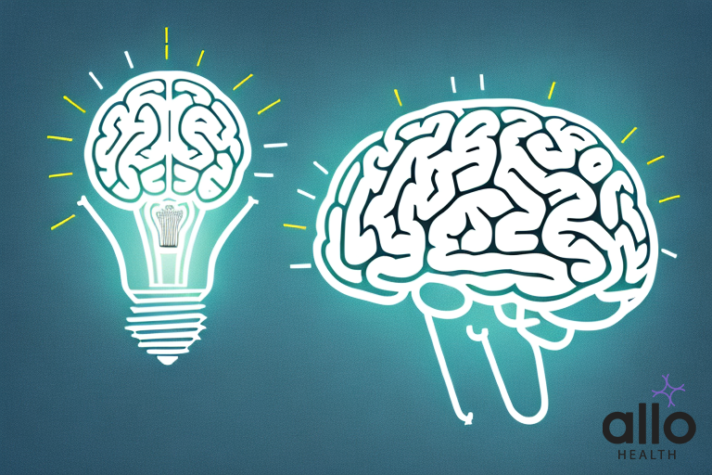How CBT Therapy Worksheets Can Help You Overcome Mental Health Challenges

Allo Health is dedicated to personalized well-being, offering support and trusted information tailored to individual health goals. The platform emphasizes human-generated content, led by a distinguished medical team of experts, including physicians and sexual health specialists. Their commitment to credibility involves rigorous fact-checking, authoritative research, and continuous updates to ensure accurate, up-to-date information. Allo Health's unique approach goes beyond conventional platforms, providing expert-led insights and a continuous commitment to excellence, with user feedback playing a crucial role in shaping the platform's authoritative voice.

Dr Sanina Mansoor holds MBBS degree from Yenepoya university,Mangalore.She has 8 years of experience working as a medical officer at various health centres and medical colleges.
Why This Was Upated?
Our experts continually monitor the health and wellness space, and we update our articles when new information became available.
Updated on 22 February, 2024
- Article was updated as part of our commitment to diversity, equity, and inclusion.

"The following blog article discusses exercise and its potential benefits for general health and well-being. However, it is important to understand that the information provided is for general educational purposes only and should not be considered as personalized exercise advice or a substitute for professional guidance from a qualified fitness professional or healthcare provider. Before starting or modifying any exercise program, it is recommended to consult with a qualified fitness professional.
Book consultation
The information presented in this article may not be suitable for everyone, as individual fitness levels, health conditions, and limitations can vary significantly. A qualified fitness professional can assess your specific fitness needs, consider any medical concerns or limitations, and provide personalized recommendations and exercise plans that are safe and effective for you.
Participating in physical activity, including exercise, carries inherent risks. It is crucial to listen to your body, exercise within your personal limits, and be aware of any signs of discomfort or potential injury. If you experience any pain, dizziness, shortness of breath, or other concerning symptoms during exercise, it is important to stop immediately and seek medical attention if necessary.
The exercises or activities mentioned in this article may not be suitable for individuals with specific medical conditions, injuries, or physical limitations."
If you’re struggling with mental health challenges, you may have heard about Cognitive Behavioral Therapy (CBT) as an effective treatment option. But what exactly is CBT therapy and how can worksheets help you overcome these challenges? In this article, we’ll explore the benefits and strategies of using CBT therapy worksheets to help you manage anxiety, depression, stress, trauma, negative thoughts, and more.
What is CBT Therapy?
CBT therapy is a type of talk therapy that focuses on the relationship between our thoughts, feelings, and behaviors. It helps you identify negative patterns and teaches you practical skills to overcome them. Instead of just talking about your problems, CBT therapy empowers you to take action and change the way you think and behave. Its a goal-oriented approach that’s typically short-term and highly effective.
CBT therapy has been found to be effective in treating a wide range of mental health conditions, including anxiety disorders, depression, post-traumatic stress disorder (PTSD), obsessive-compulsive disorder (OCD), and eating disorders. It can also be helpful in managing chronic pain and medical conditions, such as irritable bowel syndrome (IBS) and chronic fatigue syndrome (CFS). CBT therapy is often used in combination with medication and other forms of therapy to provide a comprehensive treatment plan.
Understanding the Role of Worksheets in CBT Therapy
CBT therapy worksheets are an important tool for helping you apply the skills you learn in therapy to your everyday life. They’re designed to help you practice and reinforce the new habits, thoughts, and behaviors you’re working on. CBT worksheets come in various formats and focus on different aspects of the therapy, such as identifying negative thought patterns, tracking progress, and managing emotions. By completing these worksheets, you can reinforce positive changes, identify areas for improvement, and stay motivated to continue practicing your new skills.
It’s important to note that CBT worksheets are not a substitute for therapy sessions with a licensed professional. Rather, they are a supplement to therapy that can enhance the effectiveness of treatment. Additionally, CBT worksheets can be used outside of therapy sessions, allowing individuals to continue practicing and applying the skills they’ve learned on their own time. This can be especially helpful for individuals who may not have access to regular therapy sessions or who want to continue their progress between sessions.
The Benefits of Using CBT Therapy Worksheets for Mental Health Challenges
Using CBT therapy worksheets can have many benefits. For one, they can provide structure and accountability to your therapy sessions. They can also help you gain a deeper understanding of your thoughts and feelings, and how they impact your behavior. Additionally, CBT worksheets can help you track your progress over time, which can be a great source of motivation and validation.
Another benefit of using CBT therapy worksheets is that they can be used as a tool for self-reflection and self-improvement outside of therapy sessions. By completing the worksheets on your own, you can continue to work on the skills and techniques learned in therapy and apply them to your daily life. This can lead to greater self-awareness, improved coping skills, and a better overall sense of well-being.
How to Use CBT Therapy Worksheets to Manage Anxiety and Depression
Anxiety and depression are two of the most common mental health challenges people face. Thankfully, CBT therapy can be particularly effective in treating these conditions, and worksheets can help you manage them. For example, you may complete a thought log worksheet to help you identify and challenge negative thoughts that contribute to your anxiety and depression. Another useful worksheet is a behavior activation log, which helps you identify small, achievable goals to help improve your mood and overall well-being.
In addition to these worksheets, there are other CBT therapy worksheets that can be helpful in managing anxiety and depression. For instance, a relaxation worksheet can guide you through various relaxation techniques, such as deep breathing and progressive muscle relaxation, to help you reduce stress and anxiety. Another useful worksheet is a values worksheet, which helps you identify your core values and how they can guide your behavior and decision-making. By using these worksheets in conjunction with CBT therapy, you can develop effective coping strategies and improve your mental health and well-being.
Effective Strategies for Overcoming Negative Thoughts with CBT Therapy Worksheets
Negative thoughts can be pervasive and difficult to overcome. However, CBT therapy can equip you with effective strategies to challenge and overcome them. In order to do this, worksheets can be an invaluable tool. A common one is the ABCD thought record, which helps you identify the activating event, belief, consequence, and dispute of a negative thought. Another worksheet is the downward arrow technique, which helps you identify the underlying beliefs and assumptions that contribute to negative thoughts.
Additionally, CBT therapy worksheets can also include exercises that focus on cognitive restructuring. These exercises help you identify and challenge negative thought patterns and replace them with more positive and realistic ones. For example, you may be asked to write down a negative thought and then come up with evidence that supports and contradicts it. This can help you see that your negative thought may not be entirely accurate or true.
How to Track Your Progress with CBT Therapy Worksheets
Tracking your progress is an important part of the therapy process. By doing so, you can see how far you’ve come, identify areas for improvement, and stay motivated to continue practicing your new skills. There are many worksheets available to help you track your progress, such as a goal-setting worksheet, a progress tracker worksheet, and a relapse prevention worksheet.
It is important to use these worksheets consistently and regularly, ideally on a daily or weekly basis. This will allow you to see patterns in your progress and identify any areas where you may need additional support or guidance from your therapist. Additionally, tracking your progress can help you celebrate your successes and build confidence in your ability to overcome challenges. Remember, therapy is a journey, and tracking your progress can help you stay focused and motivated along the way.
Coping with Stress and Trauma Using CBT Therapy Worksheets
Stress and trauma can have a significant impact on your mental health and well-being. However, CBT therapy can also be effective in coping with these challenges. Worksheets can help you identify triggers, learn coping skills, and practice relaxation techniques. Additionally, worksheets can help you develop a safety plan in case of a future crisis.
It is important to note that CBT therapy worksheets should be used in conjunction with professional therapy and support. While they can be a helpful tool, they are not a substitute for seeking professional help. It is also important to prioritize self-care and seek support from loved ones during times of stress and trauma. Remember, it is okay to ask for help and prioritize your mental health.
The Importance of Practicing Self-Care Alongside CBT Therapy Worksheet Exercises
While CBT therapy worksheets can be incredibly helpful, its important to remember that they’re just one part of the therapy process. Practicing self-care is an essential part of supporting your mental health and well-being. This can include things like exercise, mindfulness, social support, and engaging in activities you enjoy. Additionally, worksheets can be used to help you develop a self-care plan and track your progress.
Its also important to note that self-care can help enhance the effectiveness of CBT therapy. When you take care of yourself, you’re better able to focus on the therapy exercises and apply what you’ve learned to your daily life. Self-care can also help you manage stress and anxiety, which can be barriers to progress in therapy.
Furthermore, self-care can help you maintain the progress you’ve made in therapy. By continuing to prioritize your mental health and well-being, you can prevent relapse and build resilience. This can include incorporating self-care practices into your daily routine, seeking support from loved ones, and staying connected with your therapist.
Overcoming Limiting Beliefs and Building Self-Esteem with CBT Therapy Worksheets
CBT therapy can also help you overcome limiting beliefs and build self-esteem. Worksheets can be used to help you identify negative self-talk, challenge cognitive distortions, and develop positive affirmations. Additionally, worksheets can help you identify your strengths and accomplishments, which can help boost your self-esteem.
Furthermore, CBT therapy can assist you in recognizing and changing negative patterns of behavior that may be contributing to your low self-esteem. By identifying and modifying these behaviors, you can improve your self-image and increase your confidence. CBT therapy can also help you develop coping strategies for dealing with difficult situations, which can further enhance your self-esteem and overall well-being.
Tips for Choosing the Right CBT Therapist and Worksheet Program
Choosing the right CBT therapist and worksheet program is essential for your success. To find the right therapist, it’s important to do your research, read reviews, and ask for recommendations. When choosing a worksheet program, look for ones that are evidence-based, user-friendly, and fit your individual needs and goals. Additionally, consider working collaboratively with your therapist to develop a personalized worksheet plan that works for you.
It’s also important to consider the cost and availability of the therapist and worksheet program. Some therapists may offer sliding scale fees or accept insurance, while others may not. Similarly, some worksheet programs may be more expensive or require a subscription, while others may be free or have a one-time purchase fee. Additionally, consider the availability of the therapist and program. Are they able to accommodate your schedule and provide consistent support?
How to Incorporate Mindfulness Techniques into CBT Therapy Worksheet Exercises
Incorporating mindfulness techniques into your CBT therapy worksheet exercises can help you stay present, reduce stress, and enhance your overall well-being. For example, you may use a body scan exercise or a mindful breathing exercise before completing a worksheet. Additionally, worksheets can be tailored to incorporate mindfulness techniques, such as a gratitude journal or an acceptance worksheet.
Another way to incorporate mindfulness techniques into your CBT therapy worksheet exercises is to practice mindful eating. This involves paying attention to the taste, texture, and smell of your food, as well as the sensations in your body as you eat. You can use this technique before or after completing a worksheet to help you stay grounded and focused.
It’s also important to remember that mindfulness is not just about relaxation, but also about developing awareness and acceptance of your thoughts and emotions. Therefore, incorporating mindfulness techniques into your CBT therapy worksheet exercises can help you become more aware of your negative thought patterns and develop a more compassionate and accepting attitude towards yourself.
Success Stories: Real-Life Examples of People Who Overcame Mental Health Challenges with the Help of CBT Therapy Worksheets
Hearing real-life success stories can be a great source of inspiration and validation. Many people have overcome mental health challenges with the help of CBT therapy worksheets. For example, one person may have used a negative thought log worksheet to overcome their anxiety about public speaking, while another may have used a relapse prevention worksheet to manage their addiction. These stories serve as a reminder that you’re not alone and that there is hope for recovery.
Another example of how CBT therapy worksheets can be helpful is in managing symptoms of depression. A person may use a behavioral activation worksheet to identify activities that bring them pleasure and a sense of accomplishment, which can help combat feelings of hopelessness and low mood. Additionally, a person struggling with obsessive-compulsive disorder may use an exposure hierarchy worksheet to gradually confront their fears and reduce the intensity of their compulsions.
It’s important to note that while CBT therapy worksheets can be a helpful tool, they are not a substitute for professional therapy. It’s always recommended to seek the guidance of a licensed therapist who can provide personalized treatment and support. However, incorporating CBT therapy worksheets into your therapy sessions or self-care routine can be a valuable addition to your mental health journey.
Conclusion: Why You Should Consider Using CBT Therapy Worksheets as Part of Your Mental Health Journey
In conclusion, CBT therapy worksheets can be an incredibly helpful tool for managing mental health challenges. They provide structure, accountability, and practical skills to help you overcome negative patterns. By using CBT therapy worksheets alongside other forms of therapy and self-care, you can develop the tools and strategies you need to overcome your challenges and live a fulfilling life.
It is important to note that CBT therapy worksheets are not a substitute for professional therapy. While they can be a helpful supplement to therapy, they should not be used as a replacement for seeking professional help. It is also important to use CBT therapy worksheets under the guidance of a mental health professional, who can help you tailor the worksheets to your specific needs and goals.






































